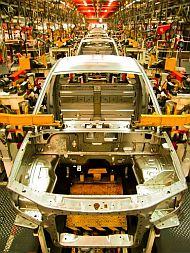Mexico's current economic boom is providing business for the country's cross-border shipping industry, but also emphasizing the industry's growing pains. In a webinar hosted by FreightWaves and sponsored by Redwood Logistics, Jordan Dewart, managing director of Redwood's new Mexico service, highlighted the unique challenges facing the industry.
In 2018, Mexico's gross domestic product (GDP) increased by 2.3 percent, and is estimated to grow by 2.7 percent in 2019. With its population growing to 130 million and unemployment staying low at 3.6 percent, the Mexican market has become a hot commodity for foreign companies.
 |
While political shifts in North America - including the election of populist Mexican President Andres Lopez Obrador and U.S. President Donald Trump's calls for a border wall between the two nations have spurred economic concerns, Dewart said that none of these have had adverse effects on the country.
"When [Obrador] came on as a populist, there were a lot of concerns and fear about how that might affect the economy, but really we haven't seen any negative impacts from his presidency as of yet," Dewart said. "I think I'd be remiss if I didn't mention that on [the U.S.] side of the border you see in the headlines every day that the wall is being built, but we don't anticipate any major effects on the Mexican economy."
Dewart also said that the replacement of the North American Free Trade Agreement (NAFTA) caused "very, very few changes," which allows supply chains in place to "anticipate moving forward smoothly."
With its economic strength seemingly secure, Mexico maintains free trade agreements with over 50 other nations.
"When you talk about a global place for foreign investment, Mexico is that place," Dewart said. "So a lot of foreign companies want to get access to the United States' market and they're investing in Mexico to do that."
While Mexico's market growth touches manufacturing, healthcare, technology and other industries, the expanding automotive market is a primary factor in the shipping industry.
 |
A graphic provided by Dewart showed $8 billion in investments into Mexico from seven different Asian and European automotive companies including Mazda, Kia, Toyota and the aforementioned companies.
With this growth, however, Mexico's cross-border shipping has become overwhelmed, highlighting problems ranging from inadequate infrastructure to a limited qualified workforce, which the Mexican government is addressing, to more intricate challenges like the exchange rate from Pesos to U.S. Dollars and demand for northbound equipment.
"It's what I call a perfect storm of factors that are affecting this imbalance and frankly it is getting worse," Dewart warned.
While Mexico is mediating some of the chronic challenges by investing in roads and education, Dewart, who has more than 20 years of experience working in third-party logistics (3PL) in Mexico, advises companies to utilize the broad scope of 3PLs to navigate the capacity and equipment shortages in the industry.
"If you've always done shipping with one truck company, that can be very risky," Dewart said. "So definitely consider using a 3PL to give you a better bite of the entire market and a lot more exposure to both sides of the border."
Dewart also recommended shippers plan for repositioning costs, leverage southbound volumes, transload at the border, reconsider a truck and rail shipping mix, review routing options and utilize annualized contract options to weather cross-border shipping challenges.
Original article


